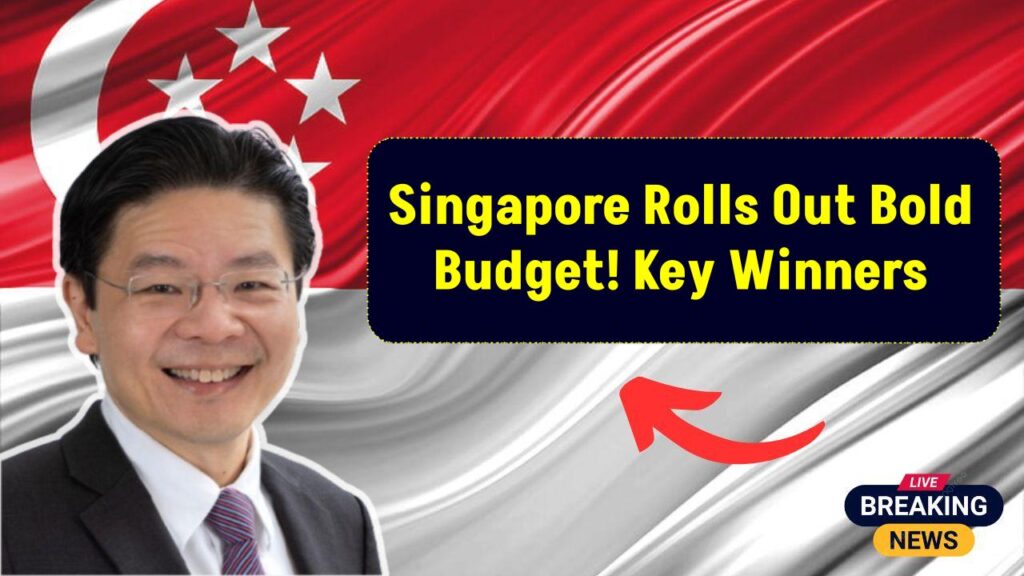Singapore Budget 2025 Delivers Bold Promises: Singapore Budget 2025 is packed with bold fiscal initiatives aimed at easing the cost of living, supporting businesses, and fueling economic transformation. Announced by Deputy Prime Minister and Finance Minister Lawrence Wong, the budget comes at a crucial time as global uncertainties persist, and the nation gears up for upcoming elections.
The key highlights? Direct cash support to households, enhanced tax rebates, and massive investments in innovation and equity markets. Whether you’re a family, senior citizen, student, or business owner, Budget 2025 has something for you.

Singapore Budget 2025 Delivers Bold Promises
| Category | Details |
|---|---|
| CDC Vouchers | S$800 for every household to offset daily expenses |
| U-Save Rebates | Up to S$760 annually for eligible HDB households to manage utility bills |
| Personal Income Tax Rebate | 60% rebate capped at S$200 (YA 2025) |
| SG60 Vouchers | S$600 for Singaporeans 21+, S$800 for seniors 60+ |
| ActiveSG Credit | S$100 credit to promote healthy living |
| LifeSG Benefits | S$500 per child for education support |
| Matched MediSave | Dollar-for-dollar top-ups for seniors (2026-2030) up to S$1,000/year |
| Corporate Tax Rebate | 50% rebate (capped at S$40,000) to support businesses |
| Progressive Wage Support | Up to 40% co-funding for low-income workers |
| Innovation Boost | S$4B+ to fuel AI, equity markets, and quantum tech |
| Official Site | mof.gov.sg/singaporebudget |
Singapore Budget 2025 delivers a powerful mix of immediate relief and long-term investment, designed to benefit every segment of society. From families and seniors to start-ups and large enterprises, the budget provides tools to navigate current economic challenges while laying the groundwork for a future-ready nation.
Support for Households and Individuals
1. Cost-of-Living Measures
Singaporeans will receive:
- CDC Vouchers worth S$800: Usable at participating supermarkets and local merchants.
- U-Save Utility Rebates: Up to S$760 annually for eligible HDB households, helping reduce electricity and water costs.
- Personal Income Tax Rebate: A 60% rebate (capped at S$200) for all taxpayers, offering instant tax relief.
2. SG60 Commemorative Payouts
In celebration of Singapore’s 60th year of independence:
- Citizens aged 21 and above will receive S$600.
- Seniors 60 and above will get S$800.
- ActiveSG credit of S$100 will be given to all Singaporeans for fitness and sports-related expenses.
3. Families and Seniors
- LifeSG Credit: Families with children aged 0-12 will receive S$500 per child; for those aged 13-20, the money will go into Edusave or PSEA accounts.
- Large Families: Additional support of up to S$16,000 for families with 3+ young children.
- Matched MediSave Top-Ups: From 2026 to 2030, the government will match voluntary contributions to seniors’ MediSave accounts dollar-for-dollar, up to S$1,000 annually.
Boost for Businesses and Entrepreneurs
1. Tax Incentives and Wage Support
To help businesses cope with costs:
- Corporate Income Tax Rebate: 50% rebate for YA2025 (capped at S$40,000).
- Progressive Wage Credit Scheme: Enhanced co-funding of wage increases for low-income workers — 40% in 2025, 20% in 2026.
2. Funding Innovation and Growth
- Private Credit Growth Fund: S$1 billion dedicated to helping high-growth enterprises access financing.
- National Productivity Fund: S$3 billion boost to fuel developments in AI, quantum computing, and sustainability tech.
3. Expanding Equity Markets
- Equity Market Development Programme: A whopping S$5 billion will be invested to grow Singapore’s capital market.
- Tax Incentives for Listings: Corporate listings on SGX will benefit from 10% or 20% tax rebates, based on market capitalisation thresholds.
Strategic Outlook: A Future-Ready Singapore
Lawrence Wong emphasized that Budget 2025 is not just about short-term support, but long-term resilience. With global trade disruptions, inflation, and digital transformation reshaping the economic landscape, Singapore is investing in its human capital, technological edge, and social safety nets.
By offering direct aid to families while equipping businesses for future-ready transformation, Budget 2025 seeks to strike a delicate balance between compassion and competitiveness.
Singapore $300 CDC Vouchers Released – How, Where & When to Use Them
Canada Housing Benefit: April 2025 Applications Now Open for $498 Payment
FAQs on Singapore Budget 2025 Delivers Bold Promises
Who is eligible for the CDC Vouchers in 2025?
All Singaporean households are eligible. The vouchers can be used at supermarkets and local merchants participating in the CDC scheme.
How do I claim the SG60 Commemorative Benefits?
Eligible citizens will receive the benefits directly through their Singpass-linked accounts. Updates will be posted on LifeSG and mof.gov.sg.
What is the timeline for MediSave top-ups?
The Matched MediSave Scheme will run from 2026 to 2030, allowing seniors to boost their medical savings.
How can businesses apply for the Corporate Income Tax Rebate?
The rebate will be applied automatically during the Year of Assessment 2025 filing. Businesses can check IRAS.gov.sg for detailed guidance.
Will the Progressive Wage Credit Scheme continue beyond 2026?
It is expected to be reviewed after 2026 based on wage growth metrics and inflation impact.










